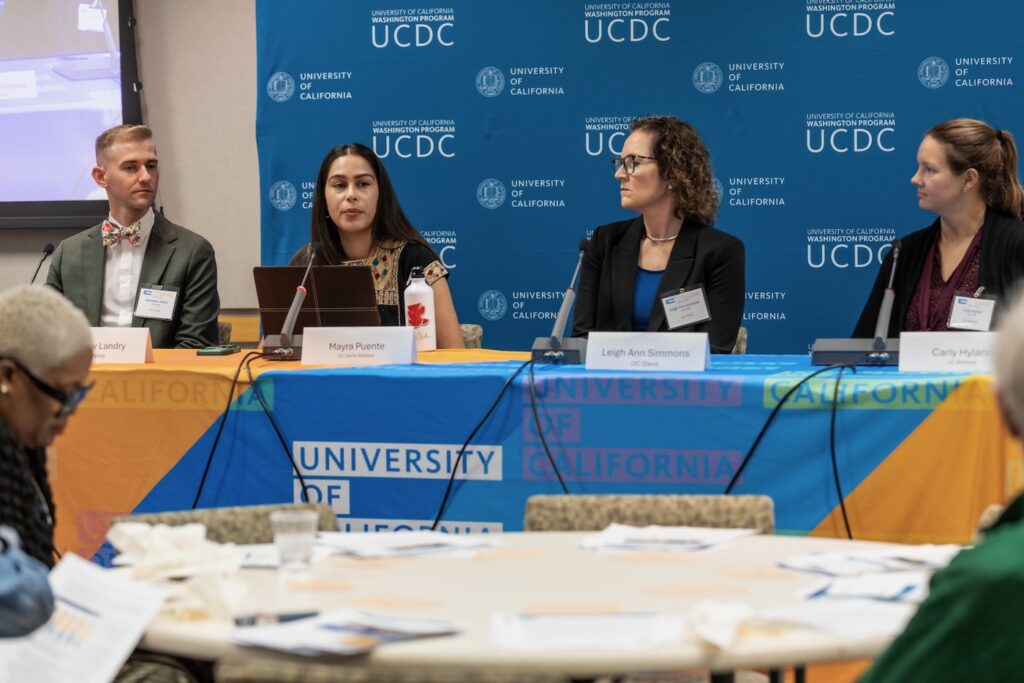
Mayra Puente speaks at a legislative briefing on Capitol Hill on the TRIO programs in May 2025.
Courtesy: Mayra Puente
President Donald Trump’s “skinny budget” proposal aims to eliminate a group of eight federally funded programs known as TRIO that support higher education access and success for individuals from “disadvantaged backgrounds.”
Eliminating these programs would be a huge mistake.
How was I, a daughter of migrant farmworkers whose parents have limited formal education and live in poverty, able to beat the odds and land a faculty position at a selective university in the U.S.? TRIO.
A recent study investigated whether becoming a professor was driven by socioeconomic status. The researchers surveyed 7,218 tenure-track faculty members at research-intensive institutions in the U.S. across eight academic disciplines between 2017 and 2020. They found that nearly one-quarter of the faculty had a parent with a Ph.D., and over half had a parent with a graduate degree. They also found that white professors were more likely to have a parent with a Ph.D. compared to Black and Latino faculty. Only 1% of Latina women have a Ph.D.
As an undergraduate student at UCLA, I participated in the Ronald E. McNair Post-Baccalaureate Achievement Program, one of the federal TRIO programs the Trump administration seeks to cut. Research demonstrates that the McNair Scholars Program is highly effective. Students who participated in the program were 78% more likely to enroll in graduate school than other low-income students.
Could I have applied to graduate school, obtained a Ph.D., and landed a faculty role without the McNair Scholars Program? Maybe. But the reality is that the majority of low-income, first-generation Latino college students like myself are unaware of the hidden curriculum of academia. Many of us are unable to rely on our parents for academic and career guidance, and we often lack access to mentors who can help us navigate the graduate school process.
The McNair Scholars Program introduced me to graduate school and the pursuit of a Ph.D. and a career in educational research as a possibility, and provided mentoring on creating and conducting empirical research studies, research, writing and conference presenting experiences, tutoring for graduate school tests, fee waivers for graduate school applications, feedback on graduate school applications, understanding graduate school and funding offers, a network of professional support at the university and beyond.
Additionally, as a researcher of higher education access and equity for first-generation rural Latino students from migrant farmworkers and low-income backgrounds, I have examined the effectiveness of other TRIO programs, like Upward Bound and Talent Search, in exposing and preparing students for college. In one qualitative research study on California’s Central Coast, a student shared, “Sometimes, I couldn’t imagine being a student from a different tiny, small town where I just didn’t have a college and career center, EAOP (Early Academic Outreach Program), and Upward Bound to help me.”
Other research finds that Upward Bound students are more than twice as likely to earn a bachelor’s degree by age 24 than other groups. The Council for Opportunity in Education also reports high success rates for students participating in other TRIO programs, including Student Support Services, Talent Search, Veterans Upward Bound, Educational Opportunity Centers (EOC), and the McNair Scholars Program.
How can something that is empirically proven to be effective be deemed “wasteful”?
The elimination of TRIO programs threatens knowledge production, innovation, and the education of current and future generations of students, who are becoming increasingly diverse and would greatly benefit from the continued existence of TRIO programs.
TRIO programs also provide services to low-income students, first-generation college students, students with disabilities, and military veterans. Higher education access, made possible through TRIO, is a means of achieving economic and social mobility, which benefits local communities, regions, and the nation as a whole. More importantly, the creation and continued support of TRIO programs is a testament to this country’s commitment to equal educational opportunity and justice for all.
Congress must reject the elimination of TRIO programs if it hopes to see a highly educated and diverse professional workforce in this country. TRIO alumni, estimated to be over 6 million by the Council for Opportunity in Education, should sign the collective TRIO alumni letter and call or write to their respective House of Representatives and Senate offices to urge them to protect and fully fund TRIO programs in the 2026 budget. TRIO alumni and others can share their TRIO success stories on social media using the hashtags #ProtectTRIO and #TRIOWorks.
The narratives and empirical evidence of the effectiveness of TRIO programs are overwhelming. My path to the professoriate is mainly due to federally funded TRIO programs.
•••
Mayra Puente is a rural Latina, assistant professor of higher education at the Gevirtz Graduate School of Education at the University of California, Santa Barbara, and a Public Voices Fellow of The OpEd Project.
The opinions expressed in this commentary represent those of the author. EdSource welcomes commentaries representing diverse points of view. If you would like to submit a commentary, please review our guidelines and contact us.

